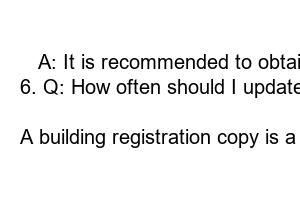건물등기부등본
Title: The Importance of a Building Registration Copy: Ensuring Compliance and Peace of Mind
Introduction:
In today’s fast-paced world, having a copy of your building registration is not only a legal requirement but also an essential document for safeguarding your property. Whether you are a homeowner or a property manager, maintaining an up-to-date building registration copy is crucial to ensure compliance with local regulations and prevent potential legal issues. In this blog post, we will explore the significance of a building registration copy and its benefits for property owners.
1. What is a Building Registration Copy?
A building registration copy is a vital document that provides legal proof of the construction and ownership of a building. It contains detailed information about the property, including its dimensions, layout, structural specifications, and any modifications made over time. This document is typically filed with the appropriate local authorities and is essential for ensuring compliance with building codes and regulations.
2. Compliance with Local Regulations:
Having a valid building registration copy helps you comply with local regulations concerning property ownership and construction. It ensures that your building meets safety and structural standards set by the authorities. Failure to possess a building registration copy can result in fines or legal actions, further complicating your property ownership.
3. Validation of Property Ownership:
A building registration copy serves as legal proof of your ownership of the property, providing a secure foundation for any real estate transaction, such as selling, transferring, or refinancing. It establishes your rights as the lawful owner and protects you from potential disputes or fraudulent claims.
4. Identification of Structural Modifications:
Over time, properties may undergo modifications or renovations. Having an updated building registration copy enables you to keep track of any structural changes made to your building. This information is crucial when seeking permits for future renovations or when resolving any potential disputes related to property alterations.
5. Insurance Coverage and Risk Mitigation:
Many insurance providers require a valid building registration copy as part of the coverage process. It allows insurance companies to understand the structural integrity and potential risks associated with the property accurately. By providing this document, you can ensure that your property is adequately insured, mitigating the financial impact of unforeseen events such as natural disasters or accidents.
6. Ease of Property Transactions:
When buying or selling a property, having a building registration copy readily available expedites the transaction process. Prospective buyers can review the document to verify the property’s compliance, modifications, and other essential details. This transparency enhances the credibility of the transaction and can lead to a smoother and faster closing.
FAQs:
1. Q: How do I obtain a copy of my building registration?
A: Contact your local authorities or relevant housing agencies to inquire about the registration process and documentation requirements.
2. Q: What happens if I fail to possess a building registration copy?
A: Failure to possess a building registration copy may result in fines, legal actions, or complications when trying to sell or refinance your property.
3. Q: Can I make modifications without updating the building registration copy?
A: It is essential to update the building registration copy to reflect any structural modifications made to your property to ensure compliance with local regulations and avoid potential legal issues.
4. Q: Is the building registration copy the same as the property deed?
A: No, the building registration copy focuses on the structural and construction aspects of the building, while the property deed primarily addresses ownership and transfer of ownership.
5. Q: Do I need a new building registration copy if I purchase a property?
A: It is recommended to obtain an updated building registration copy during property transactions to ensure accurate information and comply with regulations.
6. Q: How often should I update my building registration copy?
A: It is advisable to update your building registration copy whenever significant modifications or renovations are made to your property to reflect accurate information.
Summary:
A building registration copy is a crucial document for property owners that ensures compliance with local regulations, validates ownership, and mitigates risks. Updating this document when necessary and keeping an accurate record of any structural modifications serves as a firm foundation for property transactions and offers peace of mind in the long run.

